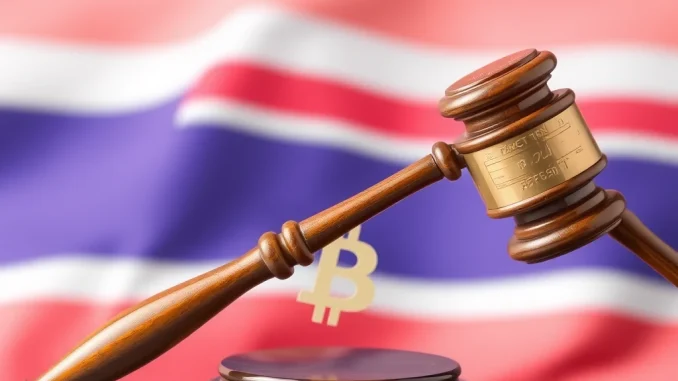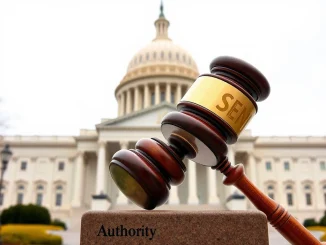
In a significant move signaling a tougher stance on cryptocurrency operations, Thailand’s Securities and Exchange Commission (SEC) has initiated legal proceedings against Aux Cayes FinTech, the company behind the popular crypto exchange OKX. The charges, unveiled in a recent report by Crowdfund Insider, allege that OKX operated as an unlicensed crypto exchange, a serious breach of Thailand’s digital asset regulations. This development sends ripples through the crypto community, raising questions about regulatory compliance and the future of digital asset trading in the region. Let’s dive into the details of this unfolding situation.
Thailand SEC Takes Decisive Action Against Unlicensed Crypto Exchange
The Thailand SEC’s complaint, lodged with the Economic Crime Suppression Division (ECD), accuses OKX and nine individuals of violating the Emergency Decree on Digital Asset Businesses of 2018. This decree is the cornerstone of Thailand’s regulatory framework for digital assets, designed to protect investors and maintain market integrity. According to the SEC’s findings, OKX allegedly provided crypto exchange services to Thai users without obtaining the necessary license, a mandatory requirement for operating legally within the country.
Here’s a breakdown of the key allegations:
- Unlicensed Operation: OKX is accused of operating a digital asset exchange without the required license from the Thailand SEC.
- Violation of Emergency Decree: The alleged actions are in direct violation of the Emergency Decree on Digital Asset Businesses (2018).
- Service Provision: The SEC’s investigation pinpointed October 15, 2021, as the date when OKX offered digital asset trading services through its online platform.
- Transaction Fees: OKX reportedly charged a 0.1% transaction fee for trades conducted on its platform.
- Extensive Promotion: The exchange allegedly engaged in widespread promotional activities across various social media channels, including Telegram, X (formerly Twitter), and Line OpenChat groups, to attract Thai users.
Why is the Thailand SEC Cracking Down on OKX?
The Thailand SEC‘s move underscores the growing global trend of regulatory bodies taking a more assertive approach towards cryptocurrency exchanges. The primary objective behind such actions is to ensure investor protection and prevent illicit activities like money laundering and terrorist financing within the digital asset space. Operating without a license not only undermines the regulatory framework but also exposes users to potential risks due to the lack of oversight and compliance measures.
Think of it like this: Imagine driving a car without a license. It’s illegal, and if something goes wrong, you’re not protected by the law. Similarly, an unlicensed crypto exchange operates outside the legal perimeter, leaving its users vulnerable.
What are the Potential Repercussions for OKX and its Users?
The legal action initiated by the Thailand SEC could have significant implications for OKX and its user base in Thailand:
- Criminal Charges: Aux Cayes FinTech and the nine individuals named in the complaint face criminal charges, which could lead to substantial fines or even imprisonment if found guilty.
- Operational Restrictions: OKX may face restrictions on its operations in Thailand, potentially leading to a shutdown of its services for Thai users if they are found to be non-compliant.
- Reputational Damage: The legal battle could tarnish OKX’s reputation, impacting user trust and potentially leading to a decrease in user base, especially in regions with stringent regulatory environments.
- Increased Regulatory Scrutiny: This case is likely to put other crypto exchanges operating in Thailand under increased scrutiny, prompting them to re-evaluate their compliance status and licensing arrangements.
The Importance of Digital Asset Regulation in Thailand
Thailand, like many other countries, is navigating the complex landscape of digital asset regulation. The Emergency Decree on Digital Asset Businesses reflects the country’s effort to balance innovation in the fintech sector with the need for investor protection and financial stability. By enforcing these regulations, the Thailand SEC aims to:
- Protect Investors: Licensing and regulatory oversight ensure that crypto exchanges adhere to certain standards, safeguarding users from fraud, market manipulation, and operational risks.
- Maintain Market Integrity: Regulation promotes fair and transparent trading practices, fostering a healthy and sustainable digital asset market.
- Prevent Illicit Activities: Compliance with anti-money laundering (AML) and counter-terrorism financing (CFT) regulations is crucial in preventing the use of crypto for illegal purposes.
- Foster Innovation Responsibly: A clear regulatory framework provides clarity for businesses operating in the crypto space, encouraging responsible innovation and growth within defined boundaries.
Navigating the Regulatory Maze: What Crypto Users Should Know
For cryptocurrency users, especially those in Thailand, this situation serves as a crucial reminder of the importance of regulatory compliance in the crypto space. Here are some actionable insights:
- Choose Licensed Exchanges: Always opt for crypto exchanges that are licensed and regulated by the relevant authorities in your jurisdiction. In Thailand, verify if the exchange has obtained a license from the SEC.
- Stay Informed: Keep abreast of the evolving regulatory landscape in your country and globally. Regulations in the crypto space are constantly changing, and staying informed is key to making sound decisions.
- Understand the Risks: Recognize that investing in cryptocurrencies carries inherent risks. Regulatory actions like this highlight the importance of understanding both the potential rewards and the potential pitfalls.
- Seek Reputable Sources: Rely on credible news sources and official announcements from regulatory bodies like the Thailand SEC for accurate information about crypto regulations and enforcement actions.
Conclusion: A Wake-Up Call for Crypto Compliance?
The legal action against OKX by the Thailand SEC is undoubtedly a significant development in the cryptocurrency regulatory landscape. It serves as a stark warning to crypto exchanges operating without proper licenses and underscores the increasing seriousness with which regulatory bodies are approaching digital asset oversight. For the crypto industry, this case could be a pivotal moment, potentially ushering in a new era of heightened regulatory scrutiny and emphasizing the critical need for compliance. As the situation unfolds, it will be crucial to observe the long-term impact on OKX, the broader crypto market in Thailand, and the global trend of cryptocurrency regulation. Stay tuned for further updates on this developing story as the legal proceedings progress.



